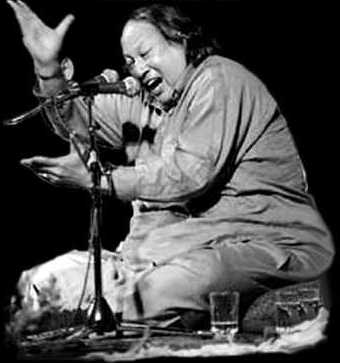Music |
Nusrat Fateh Ali Khan
By
Published: Aug 02, 2016
Category:
World
Who was bigger than Elvis?
Nusrat Fateh Ali Khan. But unless you haunt the “World Music” bins, the name is probably unfamiliar. That’s not the case anywhere else in the world; music lovers in Europe, Asia and the Middle East are well aware that Nusrat recorded some 125 CDs. And that he was very possibly the greatest singer on the planet — I read somewhere that Van Morrison called Nusrat that. The greatest singer, period.
Nusrat was a Pakistani Qawaali singer. His family had been singers for six hundred years; at 16, his father died and he was drafted into his family’s singing group. Perfect timing: Qawaali was about to change from music inspired by Sufi prayers to music that merged spirituality with technology.
Nusrat is important not only for his glorious musical achievement, but as a champion of tolerance and understanding. Muslims, Hindus and Sufis all found inspiration in his music; his concerts were love fests. [To buy the CD of the “Greatest Hits,” click here. For the MP3 download, click here. To buy the CD of “Dust to Gold” for $10 and get a free MP3 download, click here. You can’t go wrong.]
Traditional Qawaali has a fairly strict form, as devotional music often does: a lead singer and a backup group called a “party.” Groups tend to have nine musicians — five singers, a harmonium player, some drummers. A typical song lasts 15 minutes or so, but not because there are hundreds of stanzas; singers quickly move away from lyrics filled with praise for God to the kind of call-and-response that Americans tend to associate with Baptist church music in the black neighborhoods of the South.
Nusrat’s genius lay in this improvisation — and then a sudden leap into a sustained, ecstatic solo. The late Jeff Buckley described his first experience of hearing the voice of Nusrat, and nailed what it was like to be knocked back by his power:
I was all-awash in the thick undulating tide of dark Punjabi tabla rhythms, spiked with synchronized hand claps booming from above and below in hard, perfect time. I heard the clarion call of harmoniums dancing the antique melody around like giant, singing wooden spiders. Then, all of a sudden, the rising of one, then ten voices hovering over the tone like a flock of geese ascending into formation across the sky. Then came the voice of Nusrat Fateh Ali Khan. ..His voice is velvet-fire, simply incomparable. I knew not one word of Urdu, and somehow it still hooked me into a story that he wove with his wordless voice. Melody after melody crashed upon each other in waves of improvisations; with each line being repeated by the men in chorus, restated again by the main soloists, and then Nusrat setting the whole bloody thing aflame with his rapid-fire scatting. The phrase burst into a climax somewhere, with Nusrat’s upper register painting a melody that made my heart long to fly. The piece went on for fifteen minutes. I ate my heart out. I felt a rush of adrenaline in my chest, like I was on the edge of a cliff, wondering when I would jump and how will the ocean catch me.
Jeff Buckley was a late convert. Along the way Nusrat was taken up by Imran Khan, the captain of the Pakistani cricket team and a national hero. That led to soundtracks for Indian films. That brought his work to the attention of Eddie Vedder and Peter Gabriel, who used his music in “Dead Man Walking” and “The Last Temptation of Christ.”
With those films, Nusrat was poised for American success. Alas, Nusrat was a large man, and a diabetic. In 1997, he was on his way to London for treatment when he died. He was just 49.
BONUS VIDEO: “GURUS OF PEACE”
When the moon, the sun, and the thousands of stars are all yours
then why do fights happen?
lines have been drawn on the ground but don’t draw them
see that between two hearts there are these walls.
anywhere in the world, anyone would tremble from pain,
then we here recognise his pain and
our own heart also becomes heavy and our eyes cry.
What are you waiting for?
another day another dawn,
Somewhere we have to find a new way to peace
What are you waiting for?
another sign another call,
Somewhere we have to find a new way to peace!!!
why does distance remain in our hearts,
why do the distances keep growing
life is lovely, the world is lovely
with great difficulty relationships are made here
but to break them just takes one moment
love is the medicine for every pain
love is the chain between all relationships
love will break all boundaries
love will even destroy the world in one moment
it is love that will give the whole world peace
the whole world’s brilliance is from love…


